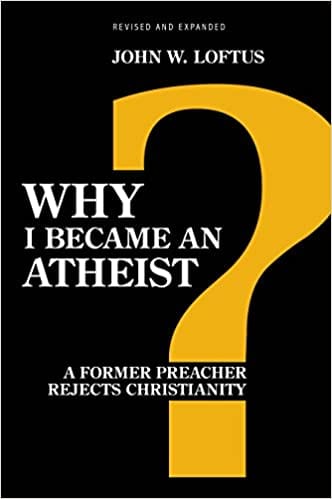
Dr. David Madison is an atheist who was a Methodist minister for nine years: with a Ph.D. in Biblical Studies from Boston University. I have replied to his videos or articles 45 times as of this writing. Thus far, I haven’t heard one peep back from him (from 8-1-19 to 4-10-21). This certainly doesn’t suggest to me that he is very confident in his opinions. All I’ve seen is expressions of contempt from Dr. Madison and from his buddy, the atheist author, polemicist, and extraordinarily volatile John Loftus, who runs the ultra-insulting Debunking Christianity blog. Dr. Madison made his cramped, insulated mentality clear in a comment from 9-6-19:
[T]he burden of the apologist has become heavy indeed, and some don’t handle the anguish well. They vent and rage at critics, like toddlers throwing tantrums when a threadbare security blanket gets tossed out. We can smell their panic. Engaging with the ranters serves no purpose—any more than it does to engage with Flat-Earthers, Chemtrail conspiracy theorists, and those who argue that the moon landings were faked. . . . I prefer to engage with NON-obsessive-compulsive-hysterical Christians, those who have spotted rubbish in the Bible, and might already have one foot out the door.
Only preaching to the choir from Dr. Madison! One can’t be too careful in avoiding any criticism or challenge. John “you are an idiot!” Loftus even went to the length of changing his blog’s rules of engagement, so that he and Dr. Madison could avoid replying to yours truly, or even see notices of my substantive replies (er, sorry, rants, rather). He wrote in part:
Some angry Catholic apologist has been tagging our posts with his angry long-winded responses. . . . If any respectful person has a counter-argument or some counter-evidence then bring it. State your case in as few words as possible and then engage our commenters in a discussion. . . . I talked with David Madison who has been the target of these links and he’s in agreement with this decision. He’s planning to write something about one or more of these links in the near future.
Needless to say, I still await these long-promised replies to any of my critiques from good ol’ Dr. Madison. His words will be in blue.
Presently, I am replying to his article, “Bible Blunders & Bad Theology, Part 6″ (11-27-20).
*****
Question Two: How Would Anyone Acquire Knowledge of a Miraculous Conception?
“Well, God told the authors, didn’t he?” This works for those who believe the Bible is God’s inspired word. But they react with proper skepticism when other religions claim the same thing for the Qur’an and Book of Mormon—which they don’t accept for a moment. Historians know very well that “God told them” doesn’t work; it’s faith-bias out of control, claiming far more than can be objectively known. John Loftus pointed this out in his Christmas day post in 2016:
How might anonymous gospel writers, 90 plus years later, objectively know Jesus was born of a virgin? Who told them? The Holy Spirit? Why is it God speaks to individuals in private, subjective, unevidenced whispers? Those claims are a penny a dozen.
You may fervently believe within your heart, but there are no data by which virgin birth can be confirmed; it is a feature of ancient folklore. . . .
How many Catholics have paused their adoration of Mary long enough to ask: How do theologians know what was happening in the womb of a first century Galilean teenager? . . .
This theology thrives among those who never ask—who have been taught not to ask—How do you know all this? All this is fueled by theological imagination, and a fair amount of craftiness too, that is, digging for texts that can be construed to support flights of fantasy. Why do people take it seriously?
I doubt that theology can be grounded in reality; objective evidence for god(s) has never been found. . . . superstitious folklore that gods use virgins to beget human children.
Wow. Really? Is Dr. Madison truly this fantastically clueless and, well, stupid? Just a moment’s thought (no more) will provide any sentient being with an IQ higher than a rusty nail enough time to figure this one out. It’s not rocket science, but it is science of a rather obvious, straightforward type: the science of biology and specifically reproduction, to be exact.
How would anyone know that they were the carriers of a baby who was not conceived by man, but by God? Here’s how it works (perhaps Dr. Madison — i.e., if he ever read any opposing opinions ever — and his equally zealous buddy John Loftus will have to read this three times to grasp it):
1) Mary is visited by an angel (the Annunciation: recorded in Luke 1:26-38).
2) This angel (Gabriel) informs her that “you will conceive in your womb and bear a son” (Lk 1:31).
3) Mary asks the logical and reasonable question: “How shall this be, since I have no husband?” (Lk 1:34). She was a farm girl. She knew how babies came about in both animals and human beings.
4) The angel explained to her that she would bear the Messiah and the Son of God / God the Son (Lk 1:32-33, 35) by means of a miraculous virgin birth: “The Holy Spirit will come upon you, and the power of the Most High will overshadow you” (Lk 1:35).
Now, how could anyone possibly find out about such a miracle? Well, we can by listening to Mary’s own testimony about it, which got to Luke either directly, or through oral tradition.
How can we possibly verify such a miracle? How can we “know”? After all, Dr. Madison in his infinite wisdom, has informed us that “there are no data by which virgin birth can be confirmed” and that it’s mere “folklore” and is simply “imagination” and “craftiness” and “flights of fantasy.” Why (Dr. Madison passionately inquires), would anyone “take it seriously”? It’s not “grounded in reality.”
Now, we all realize that we’re dealing with an atheist (and apostate) who rejects all biblical texts as inaccurate and untrustworthy: especially if they express a supernatural event that the atheist redefines out of existence before even fairly examining it. But that’s rather beside the point. Here, as in all his innumerable bashings of the Bible and Christianity, Dr. Madison is making the point that it is internally incoherent, and ought not be believed by any rational and “scientific” person.
He’s not asking the question: “why should we believe the account of Luke 1 as historical?” He’s asking a much more philosophically fundamental question and an epistemological one: how could such a thing as a virgin birth be known at all, by anyone? That’s why he frames it as “how would anyone acquire” such knowledge? In other words, how it is possible even in a theoretical or hypothetical sense, to know this and to pass it on to another chronicler like Luke? He thinks the entire thing (believe it or not believe it) is impossible and absurd from A to Z: totally ridiculous and nothing but. And so he taunts us Christians to explain this event that to him is utterly inexplicable.
With that runaround introduction, let’s get back to the second question: How can we possibly verify such a miracle? Well, again, it’s very simple:
1) In due course, it will be physically evident that she is indeed pregnant, and in nine months she delivers the baby Jesus.
2) She knows for a fact that she has not been intimate with a man at any time before Jesus was born, nor (most Christians through history have believed) at any time in her life.
3) Therefore, she has rather compelling proof that a miracle did indeed occur. She was impregnated by the Holy Spirit and not a man, precisely as the angel told her.
She not only “knows” this for sure, but she knows it with a certainly perhaps as compelling as that for any miracle ever, since babies can only come about by one natural process, which did not occur in her case.
So how can we “know”? How can anyone “confirm” or “take” the virgin birth “seriously”? I just explained it. It happened to a human being, and the most reasonable explanation is to accept that what the angel told Mary was absolutely true: since the obvious miracle has to be explained somehow.
Once Jesus was born and lived His life, performed many extraordinary miracles, claimed in many ways to be God in the flesh, and ultimately rose from the dead, even visited His followers after His death, then it was also confirmed beyond all reasonable doubt that He was God.
The entire process is verifiable and empirical at all stages: the virgin birth is a physical event that’s proven by a pregnancy occurring without intercourse. Jesus proves Who He is by performing verifiable miracles (a lame man walks, a blind man sees, a demon-possessed man is liberated; dead people are raised; Jesus Himself rises from the dead. He meets with His disciples after death and shows that He has a resurrected body, by eating fish and having Thomas feel the wound in His side. 500 people see Him after death. They go out and transform the world with His gospel message of salvation: many of them dying for their faith.
What more does one need? Nothing except faith. The atheist lacks that and immediately shrugs off all such evidence (usually with accompanying smirks and mockery). There are many possible causes for why they might do so: but none of them derive from a fair, objective examination of Christian claims, or a rational, logical analysis. We see how utterly irrational and laughable this objection was.
***
Photo credit: The Annunciation (1644), by Philippe de Champaigne (1602-1674) [public domain / Wikimedia Commons]
***
Summary: Atheist anti-theist sophist Dr. Madison asks how Jesus’ virgin birth could possibly be “confirmed”? How can anyone “know” it happened? Very simple: listen to Mary’s own report. This ain’t rocket science. But it is biological science.
***
Tags: alleged biblical contradictions, anti-Christian bigotry, anti-theism, anti-theists, Atheism, atheist exegesis, atheist hermeneutics, atheists, Bible “contradictions”, contradictions in the Bible, critiques of Christianity, David Madison, Debunking Christianity, Madison Malarkey, virgin birth, Mariology, Annunciation, Blessed Virgin Mary, John Loftus
***


























